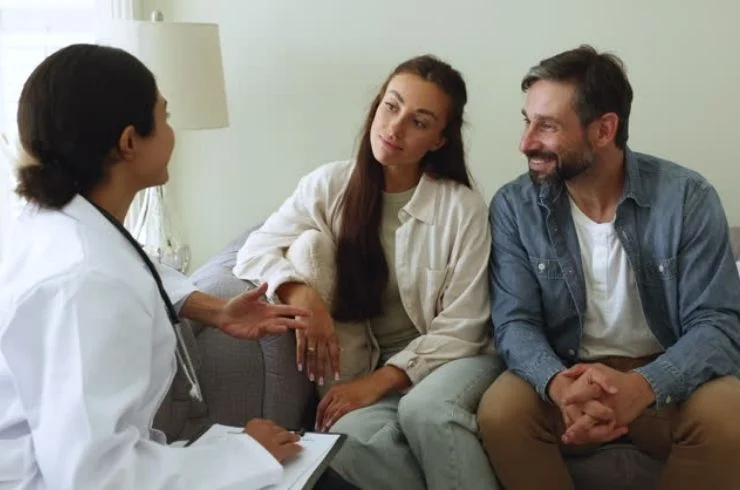


What is Couples Counseling?
Couples counseling, also known as marriage therapy or relationship therapy, is a specialized form of therapy designed to help couples address and resolve issues within their relationship. By working with a trained therapist, couples can improve communication, resolve conflicts, and strengthen their partnership. This type of therapy can be particularly beneficial for couples facing challenges such as communication problems, infidelity, or differing life goals, and it helps build healthier, more fulfilling relationships.
Why Consider Couples Counseling?
1. Improving Communication
A key reason couples seek counseling is to improve communication. Effective communication is essential for a healthy relationship, but many couples struggle with expressing their needs and feelings clearly. Couples counseling provides a safe space where partners can practice and develop better communication skills, helping them understand each other more deeply and reduce misunderstandings.
2. Resolving Conflicts
Conflicts are natural in any relationship, but the way they are handled can significantly impact the relationship’s quality. Couples counseling teaches strategies for resolving disputes constructively. Therapists help couples identify patterns of conflict, explore underlying issues, and develop effective conflict-resolution techniques to prevent arguments from escalating.
3. Addressing Specific Issues
Whether it’s infidelity, financial stress, or differing life goals, couples counseling can help address specific problems affecting the relationship. Therapists work with couples to explore these issues and find solutions that align with both partners’ needs and values.
4. Strengthening the Relationship
In addition to resolving problems, couples counseling aims to strengthen the relationship by fostering greater intimacy and understanding. Therapists guide couples in exploring their emotional connection, building trust, and developing a deeper bond.
How Does Couples Counseling Work?
1. Initial Assessment
The counseling process begins with an initial assessment, where the therapist meets with the couple to understand their concerns and relationship history. This assessment helps the therapist tailor the counseling approach to the couple’s specific needs.
2. Setting Goals
After the initial assessment, the therapist and couple collaboratively set therapy goals. These goals can vary from improving communication to resolving particular conflicts. Clear, defined goals help guide therapy sessions and allow progress to be tracked.
3. Therapy Sessions
In therapy sessions, the therapist facilitates discussions between partners, provides feedback, and introduces techniques to address relationship issues. Sessions may include joint and individual discussions, exercises, and homework assignments designed to improve the relationship.
4. Review and Adjustment
Regular progress reviews are essential to ensure therapy is effective. The therapist and couple assess progress toward the set goals and adjust the approach if necessary to continue moving forward.
Benefits of Couples Counseling
1. Enhanced Communication Skills
One of the major benefits of couples counseling is the improvement of communication skills. Partners learn to express their thoughts and feelings in a constructive way, leading to fewer misunderstandings and conflicts.
2. Better Conflict Resolution
Couples counseling provides tools and techniques for handling conflicts more effectively. Couples learn to address disagreements calmly and respectfully, navigating challenges without damaging their relationship.
3. Increased Emotional Intimacy
Therapy helps couples experience a deeper emotional connection. By sharing and exploring their feelings in a supportive environment, they build greater intimacy and trust in the relationship.
4. Strengthened Relationship
Ultimately, couples counseling can lead to a stronger, more resilient relationship. Addressing underlying issues and improving communication allows couples to develop a more fulfilling and supportive partnership.
Common Myths About Couples Counseling
1. Only for Troubled Relationships
Many people believe that couples counseling is only for relationships on the brink of collapse. In reality, counseling can benefit any relationship, whether it’s facing significant challenges or simply aiming to improve communication and strengthen the bond.
2. Therapists Take Sides
Some individuals worry that therapists will take sides in a conflict. However, professional therapists remain impartial and work to help both partners understand each other’s perspectives without favoring one side.
3. It’s a Sign of Failure
Seeking counseling is not a sign of failure; it’s a proactive step toward improving and enhancing the relationship. Many successful couples use counseling as a tool for growth and development, not as a last resort.
Finding the Right Couples Counselor
Choosing the right couples counselor is crucial for a positive therapy experience. Here are some tips to consider:
1. Credentials and Experience
Ensure the therapist is licensed and has experience in couples counseling. Look for therapists who specialize in relationship therapy and have specific training in this area.
2. Approach and Style
Therapists use various approaches, such as cognitive-behavioral therapy or emotionally focused therapy. Research these methods and choose a therapist whose approach best matches your needs.
3. Comfort and Rapport
It’s essential that you feel comfortable with your therapist. Trust and rapport are key to effective therapy, so make sure you select someone with whom you feel at ease and confident in sharing personal issues.